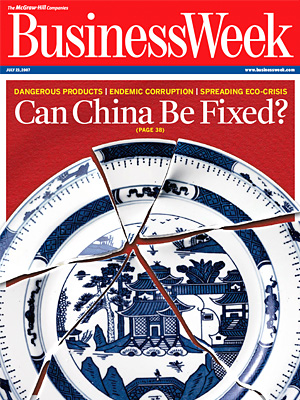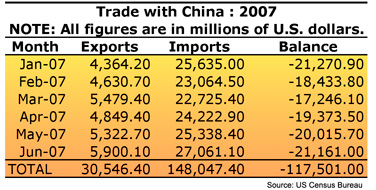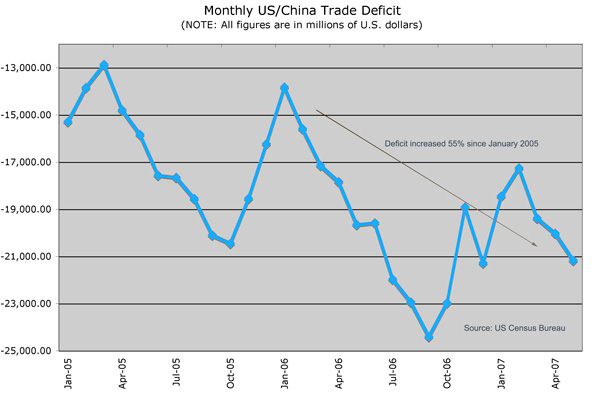The original movie, The China Syndrome, starring Jack Lemmon was a “fictional” story about one man‘s mission to stop a nuclear catastrophe from occurring. The title refers to the taunt concept of an American nuclear plant meltdown that will dissolve everything in its path until it eventually reaches all the way to China.
One wonders if we are witnessing a political and financial firestorm that will help to create a modern-day economic China Syndrome. As manufacturers looked to save money, they found an amazing opportunity waiting in Asia and have now created an economic monster that may be looking to eat its creator.
 “Dangerous products and demi-corruption, spreading eco-crisiscan China be fixed?”, are the opening comments from a recent Business Week “Cover Stories” Podcast. Tainted seafood, poison paint, fatal toys, crunchable cars, toxic toothpaste and even failing tires are the most recent headlines we are seeing in the news on a daily basis. Combine this with poor regulation and oversight within China due to political ladder-climbing which focuses on quantity over quality. There is also a high degree of nepotism at the local levels that has allowed for quality assurance to be a reduced priority.
“Dangerous products and demi-corruption, spreading eco-crisiscan China be fixed?”, are the opening comments from a recent Business Week “Cover Stories” Podcast. Tainted seafood, poison paint, fatal toys, crunchable cars, toxic toothpaste and even failing tires are the most recent headlines we are seeing in the news on a daily basis. Combine this with poor regulation and oversight within China due to political ladder-climbing which focuses on quantity over quality. There is also a high degree of nepotism at the local levels that has allowed for quality assurance to be a reduced priority.
The wealth that this has created by exporting and manufacturing to the consumer markets is amazing. These exports are largely the result of foreign investment by the world‘s multinationals. Herein is the concern will the companies which are providing the mechanism for growth by using cheap China labor and manufacturing look for other alternatives as they see growing fear over Chinese made products?
One wonders who is really at fault. Here is the question that needs to be answered: Is it the lack of a legitimate and honest regulatory environment within China or is it the push to reduce costs by the multinational companies that are pressing Chinese manufacturers and suppliers to cut corners in order to keep costs down. (and ultimately profits up)?
So, is an “economic” China Syndrome possible? As we see the continual headlines that are showing product deficiencies and even deadly ingredients, consumers will undoubtedly boycott anything that has Chinese labeling.
According to CIA World Factbook and the U.S. Census Bureau Foreign Trade Statistics, the United States is the number one importer of Chinese goods. At the top of the list are computer accessories, household good and toys. The companies that produce and sell these products to US consumers will have to quickly reevaluate their desire to utilize Chinese components in the light of the recent discoveries. At this all important time of back-to-school and holiday shopping, there will surely be a major outcry and a knee-jerk reaction that creates a BUY-AMERICAN movement.

Now, far be it for us to look at any of this from a conspiracy angle. But for the fun of it, let‘s speculate. Could this be a master-plan that utilizes a coordinated governmental attack on the Chinese manufacturers? The timing is curiously close to the heightened economic tensions between China and America. If this were the case, it would make sense that the reports of tainted products will reach a crescendo up until China caves in and agrees to Washington‘s demands. Then, the reports will surely come out about the new and improved product oversight and the eventual sounding of the “all clear” signal.
Back in May, 2007, Chao Wang, an assistant government minister led a trade delegation to and discussed the trade imbalance issue with the USA. He said, “For the interest of both our countries, and the people, and for the benefit of every state in the U.S., cooperation must remain as the mainstream,” At that time, he also hinted that he was beginning to feel the effects of “trade protectionism.”

So, if there were dark forces at work, the argument for a covert operation to increase the worries of consumers who are continuing to ravenously purchasing goods manufactured in China would be a great idea. The effect could be easily regulated and timed to create an atmosphere ranging from concern to hysteria. The economic effect of this could cause a virtual shutdown of Chinese imports. This approach will not be viewed as a governmental move that begs for retaliation. Rather, it will be a slower process brought about by the consumer rotating away from Chinese products.
The end result would be a natural reduction of the trade deficit and the eventual need for the Chinese government to realize that they are not invulnerable. It will also require other companies to re-evaluate their decisions that allowed them to be exposed to risks associated with the lack of diversification. It also brings up another interesting point: who is the ultimate beneficiary?
If the trade deficit is reduced, does that mean that companies will look inward for domestic suppliers and manufacturers? Or, is it more probable that they will seek out other emerging countries that have the capability of providing inexpensive labor that will be more cooperative and attentive to US interests. (India, Mexico, Eastern European Block countries)
As conspiracies go, this one, if taken to the extreme would effectuate an economic China Syndrome. If we cause a meltdown of imports from China, they could see an economic disaster that would affect millions.
But, that is just a fictional account of the situation. Odd as it seems, I am sure there is a good explanation for the timing on all of the recent Chinese related recalls and warnings. It is probably the result of the fact that I am in the middle of reading, Confessions of an Economic Hitman.
















